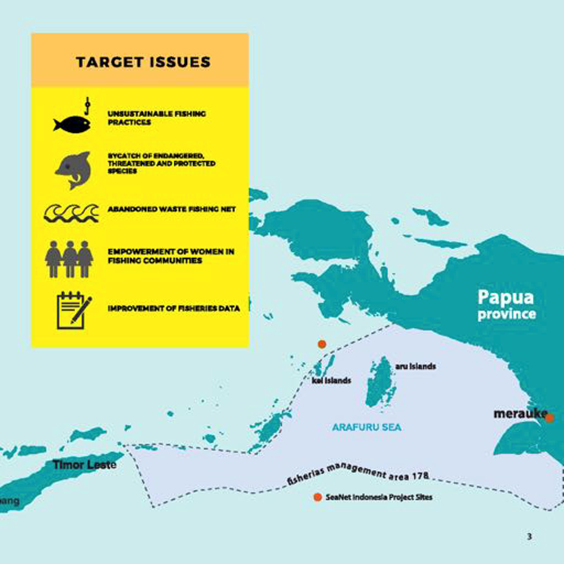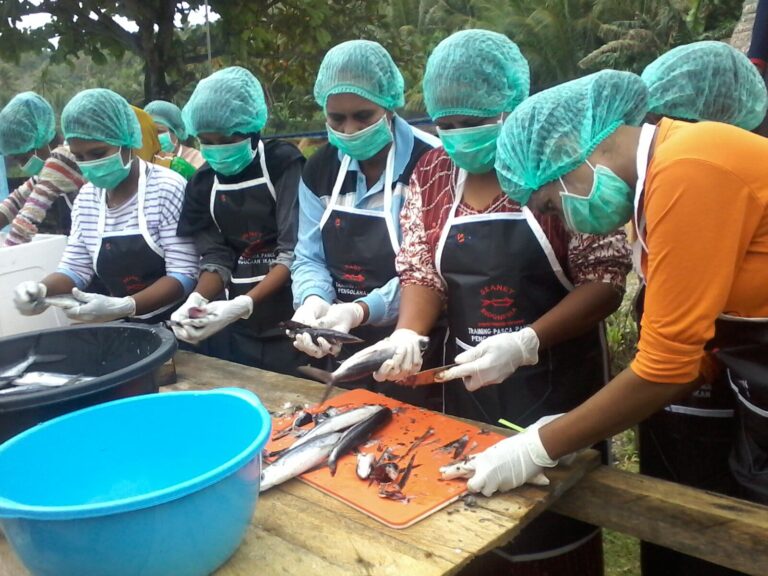SeaNet: a sustainable fishing program breathing new life into impoverished coastal fishing communities of Eastern Indonesia.
You expect fishing communities to have access to an abundance of seafood yet they’re the ones most often impacted by the destructive practices of overfishing and illegal fishing. By-catch (the unintentional capture of non-target marine species, such as turtles, dolphins and protected fish) also contributes to population decline and has a dramatic effect on marine ecosystems. Add to this the s and many communities find themselves destitute, without a reliable food source and with a failing local economy.
To combat the issue and help build self-sustaining communities, OceanEarth Foundation (formerly TierraMar) in collaboration with the Coral Triangle Center and funding from the Coral Triangle Initiative Support Program, created SeaNet Indonesia in 2017.
The focus of SeaNet Indonesia was supporting impoverished coastal fishing communities to be self-sufficient and sustainable, through an efficient and scalable program. SeaNet Indonesia applied a unique approach that delivered rapid community outcomes and laid the foundations for sustainable development and improved conservation in East Indonesia.
Within SeaNet’s first year, small-scale fishing communities were transformed by empowering local women to participate in new business activities and boosting the fishing efficiency for men, while improving the conservation of endangered marine species. It was a major step towards securing a sustainable future for these communities and the marine world on which they depend upon. Now, several years later, these communities continue to undertake the business activities initiated during the project because of the strong foundations laid.
Siti Boy Nava Rahanyaan, a 23 year old mother from Ngan village, was part of the new fish processing business which received training on hygienic practices and processed 1000 fish in 6 months into Halal certified products. She says “we have changed, and the future looks brighter.” She also says that she feels proud to understand business administration: “Now I know how to start a business to provide for my children’s future.”

SeaNet Indonesia – envisioning a new future
SeaNet Indonesia ran in Merauke, Papua and Maluku Tengarra in Indonesia – engaging deeply with the communities to better understand their needs, priorities and challenges to ensure the program was appropriate and would achieve positive social impact as well as the valuable conservation outcomes needed. The model promoted best practice for fishers and improved both their economic return and encouraged the sustainable harvest of marine resources. The project also improved the economic value of seafood-based products, post-harvest, through value adding, with a focus on improving the financial returns for women engaged in product processing and sales.
SeaNet Indonesia has demonstrated that it is possible to create a cost-effective community empowerment program that promotes sustainable fishing while protecting critical habitat and species and improving the local community economy.
Why is SeaNet Indonesia unique?
SeaNet demonstrated what could be achieved in a relatively short time frame.
For example:
- Merauke mud crab harvests were improved by 87% using a more effective and sustainable trapping method;
- A net fishery increased catches of target species and reduced by-catch of undersized fish and prawns, resulting in a 70% increase in income.
- In Maluku Tengarra by-catch of endangered species was been greatly reduced and catches of target species improved, through gear modification and training; and
- Local fishers were trained in how to better utilise different gear types and improve their compliance with fisheries regulations.
SeaNet has shown what can be achieved by applying a truly collaborative and integrated approach across communities.
Community resilience
SeaNet focuses on empowering women, through building their capacity to improve economic return from fish processing and sales. The project has paved the way for the introduction of new sustainable methods and income sources for fishing communities and has increased income by 80% for women through improving the market value of low value fish stocks, opening new markets for fish-products. In both locations, women’s groups have been trained in improved fish processing and food preparation, allowing them to gain better access to markets and obtain better prices for their products.
Fishing Net Recycling
SeaNet also created the first fishing net recycling project in Indonesia. To date, over 18 tons of waste fishing nets have been collected for recycling.
Following the terrific success of the SeaNet pilot program, and its ability to transform impoverished communities to becoming self-sustaining, OceanEarth is looking to scale the approach across Indonesia.
